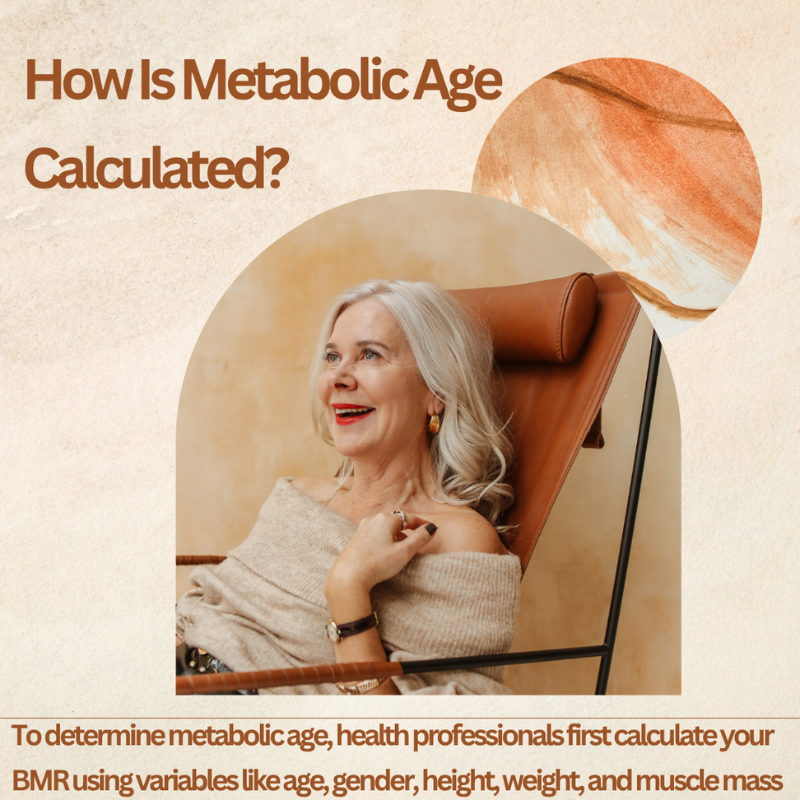Understanding your body’s health goes beyond just weight and BMI. One of the most revealing markers of internal health is metabolic age. But what does metabolic age mean, and why does it matter?
What Does Metabolic Age Mean?
Metabolic age is a comparison of your Basal Metabolic Rate (BMR) the number of calories your body burns at rest with the average BMR of people in your actual age group. If your metabolic age is lower than your actual age, it indicates you’re in good health. However, if it’s higher, it may suggest poor lifestyle habits or health risks.
In simple terms, what does metabolic age mean? It reflects how “young” or “old” your metabolism is based on how efficiently your body uses energy.
How Is Metabolic Age Calculated?

To determine metabolic age, health professionals first calculate your BMR using variables like age, gender, height, weight, and muscle mass. Then, this figure is compared to average BMR statistics of your chronological age group.
Many smart scales and fitness devices provide a rough estimate of your metabolic age. However, the most accurate assessments come from bioelectrical impedance analysis (BIA) or tests done in clinical settings.
Why Is Metabolic Age Important?
Metabolic age offers a better snapshot of your health than just the number on the scale. A high metabolic age can be a warning sign of:
- Low muscle mass
- High body fat percentage
- Poor nutrition
- Sedentary lifestyle
Conversely, a lower metabolic age often means your metabolism is running efficiently—similar to someone younger.
This is why understanding what does metabolic age mean can help you make smarter health decisions. It gives insight into your internal health and energy usage rather than just appearance.
Factors That Influence Metabolic Age
Several elements contribute to your metabolic age, including:
1. Muscle Mass
Muscles burn more calories at rest than fat. The more lean muscle you have, the higher your BMR and the lower your metabolic age.
2. Physical Activity
Regular workouts boost metabolism, even at rest. Strength training is particularly effective in reversing metabolic age.
3. Diet Quality
A nutrient-rich diet with balanced macronutrients, antioxidants, and fiber keeps your metabolism running efficiently.
4. Sleep Patterns
Poor sleep quality slows down metabolic processes, increasing your metabolic age over time.
5. Hormonal Health
Hormones like insulin, cortisol, and thyroid hormones directly affect metabolism. Imbalances can lead to weight gain and elevated metabolic age, but incorporating regular stretching exercise can help regulate stress hormones and support a healthier metabolic rate.
How to Improve Metabolic Age Naturally
Now that we understand what does metabolic age mean, let’s explore practical ways to lower it and boost your health.
Exercise Regularly
Include both cardiovascular and resistance training in your weekly routine. HIIT (High-Intensity Interval Training) and weightlifting are especially effective.
Eat Clean and Smart
Focus on whole, unprocessed foods. Prioritize:
- Lean proteins
- Healthy fats
- Complex carbohydrates
- Plenty of fruits and vegetables
Avoid sugary drinks, refined carbs, and processed snacks.
Stay Hydrated
Water is essential for metabolic functions. Dehydration can lead to fatigue and sluggish metabolism.
Get Enough Sleep
Aim for 7–9 hours of quality sleep each night. Rest is when your body repairs and resets your metabolism.
Manage Stress
Chronic stress increases cortisol, which can lead to fat retention and a higher metabolic age. Practice mindfulness, meditation, or yoga.
Track Your Progress
Use fitness apps or smart scales that offer BMR and metabolic age insights. While not perfectly accurate, they can help monitor changes over time.
Supplements That May Help
Some supplements may support metabolic health:
- Omega-3 Fatty Acids: Reduce inflammation and support fat burning
- Magnesium: Helps regulate blood sugar and insulin
- B-complex Vitamins: assist your body in converting food to energy is to start clean eating on a budget
Always consult a healthcare provider before starting any supplement routine.
How Long Does It Take to See Changes?
Improving metabolic age is a gradual process. With consistent effort especially exercise and diet you can start seeing measurable changes in 6 to 12 weeks. However, individual results may vary based on genetics, starting point, and commitment.
Understanding what does metabolic age mean helps set realistic goals and track progress more meaningfully than weight alone.
Who Should Monitor Their Metabolic Age?
Metabolic age is especially important for:
- Adults over 30
- People with weight management issues
- Those with metabolic syndrome or prediabetes
- Fitness enthusiasts tracking their health beyond aesthetics
It’s a valuable tool for anyone committed to optimizing long-term wellness.
FAQs
What does metabolic age mean compared to real age?
Metabolic age compares your BMR to average BMRs of your age group. If it’s lower, your body functions like someone younger; if higher, your metabolism may be slower than normal.
Can I lower my metabolic age with diet alone?
Diet plays a crucial role, but combining clean eating with exercise yields faster and more sustainable results.
What is considered a good metabolic age?
A good metabolic age is equal to or lower than your chronological age. It means your metabolism is functioning efficiently.
Do smart scales give accurate metabolic age?
They provide estimates based on general data, but they’re not as accurate as medical testing. Still, they’re useful for tracking changes over time.
Is a higher metabolic age dangerous?
It can indicate health risks like obesity, insulin resistance, and cardiovascular issues. It’s a sign to reevaluate lifestyle choices.
Final Thoughts
Now that you clearly understand what does metabolic age mean, it’s easier to take proactive steps toward improving it. Whether you’re trying to lose weight, build muscle, or simply enhance your longevity, targeting metabolic age provides a more holistic path to wellness.If you want expert insights, tips, and tools to support your health journey, visit MindScribes for more evidence-based resources and guidance tailored to your lifestyle.
